过去完成时与被动语态Word版
时态的被动语态结构
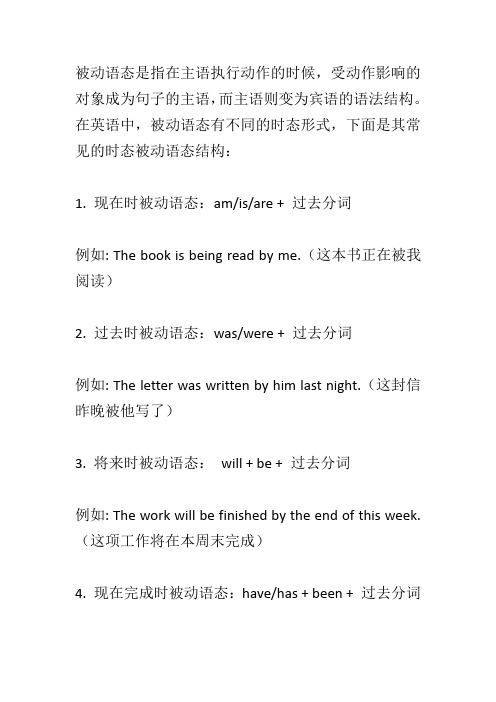
被动语态是指在主语执行动作的时候,受动作影响的对象成为句子的主语,而主语则变为宾语的语法结构。
在英语中,被动语态有不同的时态形式,下面是其常见的时态被动语态结构:
1. 现在时被动语态:am/is/are + 过去分词
例如: The book is being read by me.(这本书正在被我阅读)
2. 过去时被动语态:was/were + 过去分词
例如: The letter was written by him last night.(这封信昨晚被他写了)
3. 将来时被动语态:will + be + 过去分词
例如: The work will be finished by the end of this week.(这项工作将在本周末完成)
4. 现在完成时被动语态:have/has + been + 过去分词
例如: The house has been built for two months.(这幢房子已经建成两个月了)
5. 过去完成时被动语态:had + been + 过去分词
例如: The decision had been made by the committee before I arrived.(这个决定在我到达之前已经被委员会做出了)
注意,在使用被动语态时,主语变为宾语,谓语动词的过去分词形式放在be 动词后面。
同时,主语在句子中通常会被放在by 后面,表示动作执行的对象。
但有时候,by 短语也可以省略。
(完整word版)八种时态主动语态被动语态
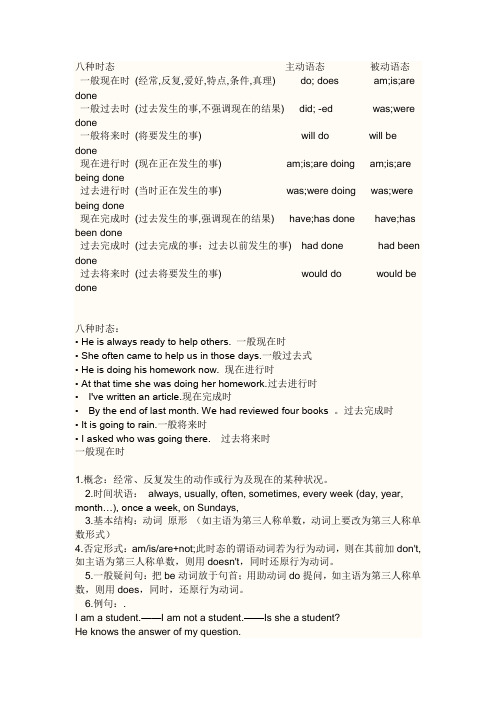
八种时态主动语态被动语态一般现在时(经常,反复,爱好,特点,条件,真理) do; does am;is;are done一般过去时(过去发生的事,不强调现在的结果) did; -ed was;were done一般将来时(将要发生的事) will do will be done现在进行时(现在正在发生的事) am;is;are doing am;is;are being done过去进行时(当时正在发生的事) was;were doing was;were being done现在完成时(过去发生的事,强调现在的结果) have;has done have;has been done过去完成时(过去完成的事;过去以前发生的事) had done had been done过去将来时(过去将要发生的事) would do would be done八种时态:• He is always ready to help others. 一般现在时• She often came to help us in those days.一般过去式• He is doing his homework now. 现在进行时• At that time she was doing her homework.过去进行时• I've written an article.现在完成时• By the end of last month. We had reviewed four books 。
过去完成时• It is going to rain.一般将来时• I asked who was going there. 过去将来时一般现在时1.概念:经常、反复发生的动作或行为及现在的某种状况。
2.时间状语:always, usually, often, sometimes, every week (day, year, month…), once a week, on Sundays,3.基本结构:动词原形(如主语为第三人称单数,动词上要改为第三人称单数形式)4.否定形式:am/is/are+not;此时态的谓语动词若为行为动词,则在其前加don't,如主语为第三人称单数,则用doesn't,同时还原行为动词。
被动语态详解(Word版)
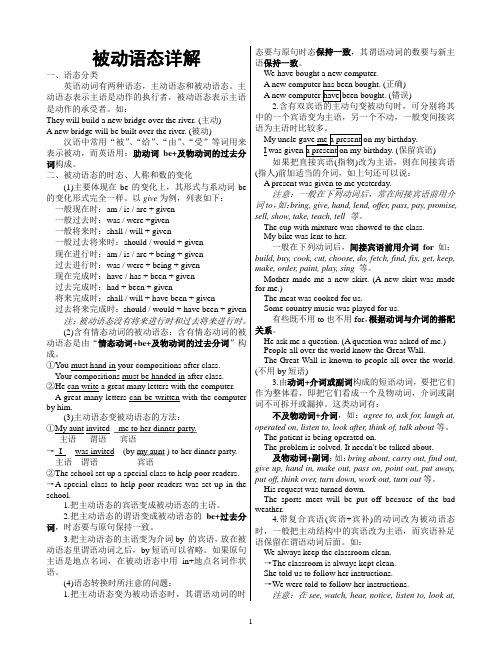
被动语态详解一、语态分类英语动词有两种语态,主动语态和被动语态。
主动语态表示主语是动作的执行者,被动语态表示主语是动作的承受者。
如:They will build a new bridge over the river. (主动)A new bridge will be built over the river. (被动)汉语中常用“被”、“给”、“由”、“受”等词用来表示被动,而英语用:助动词be+及物动词的过去分词构成。
二、被动语态的时态、人称和数的变化(1)主要体现在be的变化上,其形式与系动词be 的变化形式完全一样。
以give为例,列表如下:一般现在时:am / is / are + given一般过去时:was / were +given一般将来时:shall / will + given一般过去将来时:should / would + given现在进行时:am / is / are + being + given过去进行时:was / were + being + given现在完成时:have / has + been + given过去完成时:had + been + given将来完成时:shall / will + have been + given过去将来完成时:should / would + have been + given 注:被动语态没有将来进行时和过去将来进行时。
(2)含有情态动词的被动语态:含有情态动词的被动语态是由“情态动词+be+及物动词的过去分词”构成。
①You must hand in your compositions after class.Your compositions must be handed in after class.②He can write a great many letters with the computer.A great many letters can be written with the computer by him.(3)主动语态变被动语态的方法:①My aunt invited me to her dinner party.主语谓语宾语→I was invited (by my aunt ) to her dinner party.主语谓语宾语②The school set up a special class to help poor readers. →A special class to help poor readers was set up in the school.1.把主动语态的宾语变成被动语态的主语。
Unit3SectionⅢGrammar——过去完成时及其被动语态

Unit3SectionⅢGrammar——过去完成时及其被动语态Section ⅢGrammar——过去完成时及其被动语态一、定义[合作探究]—Did you have difficulty finding Ann’s house?——你们找到安的家有困难吗?—Not really.She had given us clear directions and we were able to find it easily. ——算不上难。
她已经给了我们她家的具体的位置,我们能够容易地找到它。
By the end of 2017, he had collected more than a thousand foreign stamps.到2017年底,他已经收集了1 000多枚外国邮票。
I had been at the bus stop for 20 minutes when a bus finally came.我在车站等了20分钟才来了辆公交车。
[自主发现1]①过去完成时的构成:had__done②表示在过去某个时间或动作之前就已经发生的动作,通常简称为“过去的过去”。
句中常有by, by the end of等介词(短语)和by the time, before, when, until 等引导的状语从句。
③过去完成时表示发生在过去某个动作或时刻之前的动作一直延续到过去的另一个时间,常与for,__since等词连用。
图示为:二、固定句型中的过去完成时[合作探究]I had hardly stepped into the classroom when the bell rang.我一踏入教室的门,铃就响了。
No sooner had I reached home than it began to rain.我刚到家就开始下雨了。
It was the first time that I had chatted online in English.那是我第一次用英语在网上聊天。
八大时态的被动语态结构

八大时态的被动语态结构
以下是八大时态的被动语态结构:
1. 现在时被动语态(Present Simple Passive):主语 + am/is/are + 过去分词。
2. 过去时被动语态(Past Simple Passive):主语 + was/were + 过去分词。
3. 将来时被动语态(Future Simple Passive):主语+ will be + 过去分词。
4. 现在进行时被动语态(Present Continuous Passive):主语 + am/is/are being + 过去分词。
5. 过去进行时被动语态(Past Continuous Passive):
主语 + was/were being + 过去分词。
6. 现在完成时被动语态(Present Perfect Passive):
主语 + has/have been + 过去分词。
7. 过去完成时被动语态(Past Perfect Passive):主语 + had been + 过去分词。
8. 将来完成时被动语态(Future Perfect Passive):主语 + will have been + 过去分词。
(完整版)各种时态的被动语态举例

各种时态的被动语态举例(以动词do为例)1.一般现在时(am/ is/ are +done)English is spoken by lots of people in the world. 世界上的许多人都说英语。
Class meeting is held every Thursday. 每周四都举行班会。
The classroom is cleaned by the students every day. 学生们每天都打扫教室。
2.一般过去时(was/ were +done)The cup was broken by the boy. 杯子被那个男孩打碎了。
He was saved at last. 他最终获救了。
My bike was stolen. 我的自行车被偷了。
3.一般将来时与过去将来时(will/ shall be +done; would/should be +done)A speech will be given this afternoon. 今天下午有一个演讲。
A new road will be built next year. 明年要修一条新马路。
I thought thousands of people would be helped. 我认为将有数千人得到帮助。
4.现在进行时与过去进行时(am/ is/ are being +done; was/ were being +done) The machine was being repaired at this time yesterday. 昨天这时,机器正在被修理。
The problem is being discussed now. 问题正在被讨论。
A bus is being pushed by the passengers. 路人正在推一辆公共汽车。
5.现在完成时(have/ has been + done)Two hundred trees have been planted by now. 到现在为止,已经种了二百棵树了。
完整版)各种时态的被动语态

完整版)各种时态的被动语态1.删除无关段落。
2.改写:各种时态的被动语态由“主语+be+及物动词的过去分词”构成,助动词的形式会随时态、人称和数的变化而变化。
具体结构如下:一般现在时:主语+am/is/are+过去分词一般过去时:主语+was/were+过去分词一般将来时:主语+shall/will+be+过去分词现在进行时:主语+am/is/are+being+过去分词过去进行时:主语+was/were+being+过去分词现在完成时:主语+has/have+been+过去分词过去完成时:主语+had+been+过去分词过去将来时:主语+should/would+be+过去分词含有情态动词的被动语态:主语+情态动词+be+过去分词。
3.改写:这个教室每天都会被打扫。
4.改写:我们的学校是在1998年建造的。
5.改写:运动会将在明天举行。
6.改写:这辆汽车正在被修理。
7.改写:那时候那台机器正在被涂漆。
8.改写:这家银行已经建成了。
9.改写:在我来这里之前,我已经被邀请去日本访问了。
10.改写:XXX告诉我她将会被派往美国。
11.改写:这辆自行车不能放在这里。
I XXX invited so far。
so I'm not sure。
The government in our country will now record tourists' bad r。
It is XXX。
Special passive voice forms:1.When a sense verb (XXX) or a causative verb(make/let/have) is followed by an infinitive without "to" in an active sentence。
the "to" should be added in a passive sentence。
被动语态总结

被动语态的用法被动语态的时态基本公式:主语+ be + 动词的过去1. 一般现在时的被动语态:am/is/are cleaned2. 一般过去时的被动语态:was/were cleaned3. 一般将来时的被动语态:will be cleaned4. 现在进行时的被动语态:am/is/are being cleaned5. 现在完成时的被动语态:have/has been cleaned6.过去完成时的被动语态:had been cleaned被动语态还有一些特殊用法一.用主动的形式表达被动的概念。
1> 动词read, sell, last, wash, write, lock等带状语,如well, easily时.e.g.①This kind of cloth washes easily.(这种布好洗)②The meeting lasted three hours.(会议持续了三个小时)③My new pen writes well. (我的新钢笔好写)2> 感官动词feel, look, smell, sound, taste, prove等与形容词连用时.e.g. ①You look very well today. ②Your bedroom smelt so terrible.③My words proved right.3> begin, end, stop, open, close等表示开,关,结束的含义时,及break out, take place, happen等动词表示爆发,发生概念时。
e.g. ①The library opens at ten. ②Class begins at half past eight.③An earthquake took place in Tang Shan in 1976.4> 某些做表语的形容词后,用不定式的主动形式。
过去完成时结构与用法

过去完成时得结构与用法过去完成时(The Past Perfect Tense):过去完成时表示过去某一时间之前完成得动作或发生得情况,句子谓语形式由had+动词得过去分词构成,通常表述为“过去得过去”。
在不同得句子结构中有相应体现,也可跟有一定得时间状语,如by, before等介词或连词。
1、过去完成时得结构:1、1 肯定句:主语+had+done+othersA、I had arrived、我已经到了。
B、He had sent the letter、她已经寄了这封信。
1、2 否定句:主语+had+not+done+othersA、However,Her father had not brought her birthday presents、然而,她得父亲没有给她买生日礼物。
1、3 疑问句:had+主语+done+others肯定回答:YES,主语+had/否定回答:NO,主语+ hadn’tA、Had Lisa gone to costume ball ?丽莎已经去化妆舞会了吗?Yes,she had、就是得,她去了。
No,she hadn’t、没有,她没去。
1、4 特殊疑问句:特殊疑问词+had+主语+done+othersA、Why had The Castle bee a memory of generation? 为什么电影城堡已经成为了一代得记忆?1、5 被动语态:主语+had(not)been+done+othersA、At the end of last year,another magic design had been pleted、在去年低,另一个神奇得设计已经完成。
B、There was still doubtful that why the film had not been chased by public、对于这部电影为什么没有被大众所追捧依然存在些疑惑。
2、过去完成时得用法2、1 在宾语从句中得运用:A、To my surprise,Josh told me that he had engaged、令我惊讶得就是,乔希告诉我她已经订婚了。
过去完成时被动
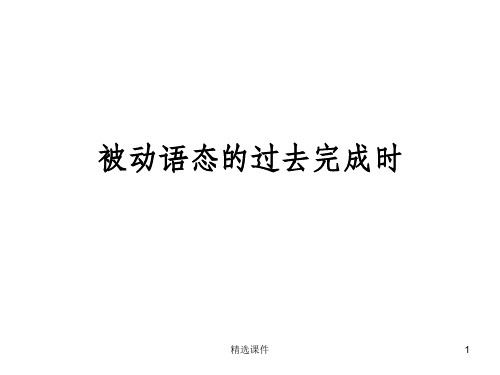
13
He often says, “China is great.” He often says (that) China is great.
“I don’t want to play football.” he said. He said (that) he didn’t want to play football.
精选课件
6
3. 自从我到这已经十年了. It is ten years since I came here. It was ten years since I had come here. 4. By the time he graduated,
he_h_a_d_l_e_a_rn_t_____(learn) a lot.
I had intended to call on you.
精选课件
9
practice
1. We_h_u_r_ri_e_d_(hurry) to the station only to find that the train_h_a_d_b_e_e_n_d_e_l_ay(deedlay)
2. A year passed when it _re_a_li_z_e(drealize) that the parcel_h_a_d__b_ee_n__s_en(stend) to the
wrong address.
3. They _b_e_g_a_n_(begin)to climb the mountain after they_h_a_d_b_o_u_g_h(tbuy)some
food.
4. He told us light_tr_a_v_e_ls_(travel)faster than
(完整word版)初中英语八大时态表
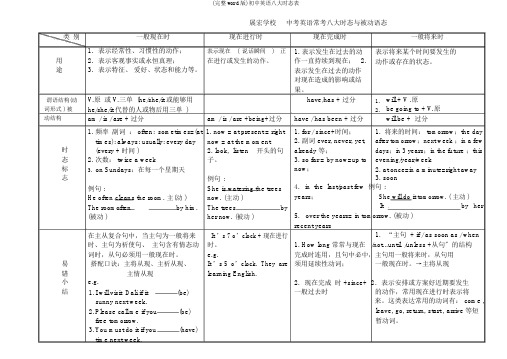
展宏学校中考英语常考八大时态与被动语态类别一般现在时现在进行时现在完成时一般将来时用途谓语结构(动词形式 ) 被动结构时态标志1.表示经常性、习惯性的动作;表示现在(说话瞬间)正2.表示客观事实或永恒真理;在进行或发生的动作。
3.表示特征、爱好、状态和能力等。
V.原或 V.三单 (he/she/it 或能够用he/she/it 代替的人或物后用三单 )am / is / are + 过分am / is / are +being+过分1. 频率副词: often;sometimes=(at 1. now = at present = righttimes); always; usually; every day now = at the moment(every + 时间 ) 2. look, listen开头的句2. 次数: twice a week子。
3. on Sundays:在每一个星期天例句 :例句 :She is watering the treesHe often cleans the room. 主(动 )now. (主动 )The roomoften by him.The trees by(被动 )her now. (被动 )1. 表示发生在过去的动表示将来某个时间要发生的作一直持续到现在; 2.动作或存在的状态。
表示发生在过去的动作对现在造成的影响或结果。
have/has + 过分 1.will + V .原2.be going to + V.原have / has been + 过分will be + 过分1. for / since+时间; 1.将来的时间: tomorrow;the day2. 副词 ever, never, yet,after tomorrow;next week ;in a fewalready 等;days;in 3 years;in the future ;this3. so far = by now=up to evening/year/weeknow; 2. at once=in a minute=right away3.soon4.in the last/past few 例句 :years;She will do it tomorrow. ( 主动 )It by her5.over the years= in tomorrow. (被动 )recent years在主从复合句中,当主句为一般将来It ’s 7 o’clock + 现在进行时、主句为祈使句、主句含有情态动时。
【英语】过去完成时知识点总结(word)

【英语】过去完成时知识点总结(word)一、初中英语过去完成时1.——Jim, did you take out the trash just now?——No. By the time I came home it .A. have been taken outB. had taken outC. had been taken out【答案】 C【解析】【分析】take out拿出,带出,by the time直到,came home是过去时,扔垃圾是发生在came之前的动作,过去完成时表示的是过去的过去。
又有be+动词过去分词构成被动语态。
had been+过去分词,含有被动语态的过去完成时。
句意:Jim,刚才是你把垃圾扔了吗?不,我回来的时候垃圾已经被扔了。
故选C。
【点评】考查被动语态及过去完成时的用法。
2.By the time I finished my homework,my mother .A. sleptB. has been asleepC. was asleepD. had been asleep【答案】 D【解析】【分析】由上文“By the time ”和“ finished”可知此处应为过去完成时,故选D.【点评】考查过去完成时。
3.By the end of 2012, many buildings built in our city.A. have beenB. haveC. had beenD. will【答案】 C【解析】【分析】句意:到2012年底,我们的城市里已经建成了很多大楼。
Buildings是build这一动作的承受者,该用被动语态。
而被动语态是由“be + 及物动词的过去分词”构成。
根据By the end of 2012可知该用过去完成时,所以选C。
4.Yesterday when I _______ to the station, the train ______ already.A. got, had leftB. got, has leftC. had got, leftD. got, left【答案】 A【解析】【分析】句意:昨天当我到达车站时,火车已经离开了。
(完整版)英语被动语态总结
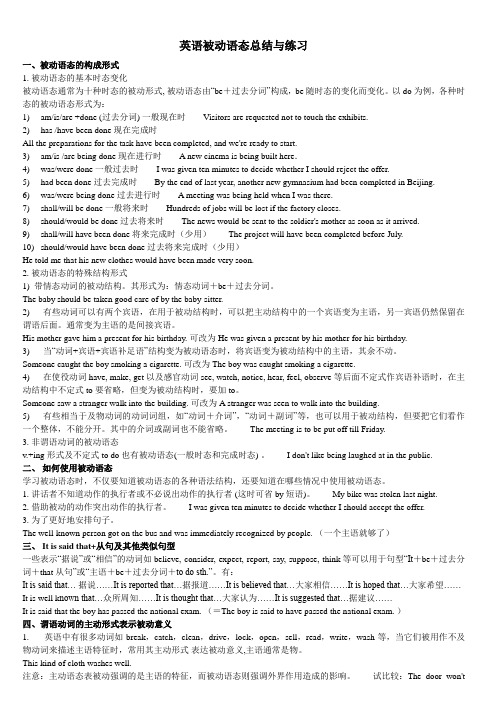
英语被动语态总结与练习一、被动语态的构成形式1. 被动语态的基本时态变化被动语态通常为十种时态的被动形式, 被动语态由“be+过去分词”构成,be随时态的变化而变化。
以do为例,各种时态的被动语态形式为:1) am/is/are +done (过去分词) 一般现在时Visitors are requested not to touch the exhibits.2) has /have been done 现在完成时All the preparations for the task have been completed, and we're ready to start.3) am/is /are being done 现在进行时 A new cinema is being built here.4) was/were done 一般过去时I was given ten minutes to decide whether I should reject the offer.5) had been done 过去完成时By the end of last year, another new gymnasium had been completed in Beijing.6) was/were being done 过去进行时 A meeting was being held when I was there.7) shall/will be done 一般将来时Hundreds of jobs will be lost if the factory closes.8) should/would be done 过去将来时The news would be sent to the soldier's mother as soon as it arrived.9) shall/will have been done 将来完成时(少用)The project will have been completed before July.10) should/would have been done 过去将来完成时(少用)He told me that his new clothes would have been made very soon.2. 被动语态的特殊结构形式1) 带情态动词的被动结构。
8 过去完成时及其被动语态

3. By ten yesterday evening, she had finished writing.
4. He had studied English for five years before he came here.
5. When I woke up, it ____(stop) raining.
6. Peter ____(collect) more than 300 Chinese stamps by the time he was ten.
7. By the end of last year, he___(work) in the factory for twenty years.
She said that the cat had caught over eight hundred mice in his life.
But she also said that he had dreamt about mice at night. She was scared that the cat was to catch them. "But the mice are only imaginary," said the friend. "So is the cat," whispered Mrs Brown.
_____________________________________________________________
中译英
1. 到上学期末,我已经学了5 首英文歌。(by the end of)
2. 韩梅告诉我她吃过午餐了。 (have lunch)
3.当我5岁时,我已经学会游泳了。 (learn)
现在完成时、过去完成时和被动语态

I. The Present and Past Perfect Tense II. The Passive现在完成时主要表示:(1)动作或过程发生在说话之前某个时刻,到现在已经完成,兵语现在的情况有联系;常和一些表示不确定时间的副词连用。
如:already ,ever ,just, never, often ,yet等。
Have you ever travelled by air ?你乘过飞机旅行吗?We have already learnt a lot of English knowledge.我们已经学了很多英语知识。
(2)动作或状态从过去某一时刻开始,持续到现在刚刚结束,或可能在继续下去;常和for since等词连用。
如:He has stayed under water for seven days.他已经在水下呆七天了。
He has learnt a lot since he came here.他到这以来已经学了不少东西。
注:现在完成式和一般过去时的动作都发生在过去某一时刻。
现在完成时从“现在”看问题,强调动做与现在的联系,所以通常不和表示过去某一确定时间的状语连用;而一般过去时则从“过去”看问题,说明动作在过去某一特定时刻发生,不涉及语现在的或完成。
常和介词by(意为“在…之前”,如:by four o’clock ,by that time ,by the end of last week 等),before以及表示过去时间的状语从句连用。
如:By nine o’clock last night ,we had got 200 pictures from the spaceship .到昨晚九点钟之前为止,我们已经从那艘宇宙飞船收到了二百张照片。
The play had already started when we got to the theatre.我们到剧场时戏已经开演了。
- 1、下载文档前请自行甄别文档内容的完整性,平台不提供额外的编辑、内容补充、找答案等附加服务。
- 2、"仅部分预览"的文档,不可在线预览部分如存在完整性等问题,可反馈申请退款(可完整预览的文档不适用该条件!)。
- 3、如文档侵犯您的权益,请联系客服反馈,我们会尽快为您处理(人工客服工作时间:9:00-18:30)。
◎过去完成时概念:表示过去的过去过去完成时:即过去的过去所发生的事情!其构成是:主语+had+过去分词。
用法:①表示过去某一时刻之前已经完成的动作,常与由by,before引导的时间状语连用。
We had learned 5000 words by the end of last month.到上个月底为止我们已经学了五千个单词。
I had finished the composition before supper.晚饭前我就已经把作文写完了。
②表示过去某一动作之前已经完成的动作,常与由when,before等连词引导的时间状语从句连用。
When I woke up it had already stopped raining.我醒来的时候雨就已经停了。
I hadn’t learned any English before I came here.我来这儿之前没学过英语。
③用于宾语从句或间接引语中I wondered who had taken the umbrella without permission.我想知道谁不经允许就把雨伞拿去。
He told me that he had passed the exam.他告诉我他已通过考试。
被动语态熟记结构被动语态的结构为“助动词be+及物动词的过去分词(p. p)”。
被动语态的不同时态是通过be的时态变化来表示的,其人称和数方面应与主语保持一致。
其具体变化为:一般现在时:am/is/are+p. p.—Look! What a nice garden!—Yes. It every day.A. is cleanedB. has been cleanedC. is being cleanedD. was cleaned(选A。
考查一般现在时的被动语态)(泰安市)一般过去时:was/were+p. p.①—Who’s the little boy in the photo, Susan?—It’s me. This photo ten years ago.A. takesB. is takenC. tookD. was taken(选D。
考查一般过去时的被动语态)(北京)②I’m sure the telephone before the car.A. inventedB. is inventedC. was inventedD. is inventing(选C。
考查一般过去时的被动语态)(天津)③The telephone by Bell in 1876.A. inventB. inventsC. was inventingD. was invented(选D。
考查一般过去时的被动语态)(吉林)④Professor Yi Zhongtian to the Talk Show on CCTV -1 last weekend.A. invitesB. invitedC. was invited(选C。
考查一般过去时的被动语态)(山西)⑤—How clean the window is!—Yes. It just now.A. has been cleanedB. was cleanedC. is cleanedD. will be cleaned(选B。
考查一般过去时的被动语态)(盐城)一般将来时:shall /will be +p. p.—People say the subway building in Harbin in a few years.—Sounds . I have never seen it before.A. will finish, interestingB. is finished, interestedC. will be finished, interesting(选C。
考查一般将来时的被动语态)(哈尔滨)现在完成时:have /has been +p. p.现在进行时:am/is/are+being+p. p.过去将来时:should /would be +p. p.含情态动词的被动结构:情态动词+be+p. p.①—Some of the plastic bags can’t after June 1.—Yes, people will use environmental bags instead.A. useB. be useC. be usedD. are used(选C。
考查含情态动词的被动语态)(湖北省咸宁市)②—There is a lot of wind in North China.—Well, more trees every year to stop the wind.A. must be plantedB. can plantedC. should planted(选A。
考查含情态动词的被动语态)(四川省自贡市)明确用法被动语态常用于以下两种情况:1. 不知道谁是动作的执行者,或者没有必要指出谁是动作的执行者;2. 强调动作的承受者。
例如:这棵树是那个男孩弄断的。
The tree ______ ______ by that boy.(填was broken)熟练转换将主动语态变为被动语态的基本方法为:将主动语态的宾语作为被动语态的主语;谓语动词变为“be+及物动词的过去分词”,并通过be的变化来表达出不同的时态;③主动语态的主语变为介词by的宾语,组成介词短语放在被动结构中的谓语动词之后。
(有时by短语可以省略)。
例如:①The terrible earthquake destroyed thousands of houses in that area. (上海市)Thousands of houses in that area by the terrible earthquake.②More and more foreigners speak Chinese in the world now. (重庆市)Chinese by more and more foreigners in the world now.③Dangerous driving causes many accidents. (山东省临沂市)Many accidents by dangerous driving.注意特例将主动语态变为被动语态应注意以下几个特殊情况:A. 带有双宾语的动词变为被动语态时,可以把其中一个宾语变为被动语态的主语,若将直接宾语(sth.)变为主语,需根据习惯在原间接宾语前加上介词to或for。
用to的常见词有:give, show, send, lend, pass, pay, teach, throw, take, bring etc. 用for的常见词有:make, choose, sing, play, draw, save, buy, get, leave, cook etc.eg. 1. Mary gave him some books.He was given some books by Mary.Some books were given to him by Mary.2. Her father bought her a new bike.She was bought a new bike by her father.A new bike was bought for her by her father.B. 带复合宾语(宾语+宾语补足语)的动词变为被动语态时,只能将宾语变为被动语态的主语,宾语补足语不可变为主语。
eg. 1. We call him Gina.He is called Gina (by us).2. They made me happy.I was made happy( by them).3. He asked me to come here.I was asked to come here (by him)C. 在see, let, make, hear, watch etc.动词之后,作宾语补足语的动词不定式不带to,但在变为被动语态时,则一定要加上to。
eg. 1. We saw them play football just now.They were seen to play football just now.2. We often hear her sing in English.She is often heard to sing in English.【练一练】1. The boy _ __ streets without pay in the old days.A. was made to cleanB. made cleanC. made to cleanD. was made clean2. These children ___ _ dance.A. were seen toB. were seen forC. were seenD. saw to3.The monkey was seen ____ _ off the tree.A. jumpB. jumpsC. jumpedD. to jumpD. 在某些“不及物动词+介词/副词”(相当于及物动词)的句子中,变被动语态时,注意不要丢掉介词/副词。
eg. 1. People often talk about that film.That film is often talked about.2. We should speak to the old people politely.The old people should be spoken to politely.【练一练】1. Old people must be looked after well and _ __ politely.A. speak toB. spokenC. speakD. spoken to2. Old people must _ __.A. look after wellB. be looked well afterC. looked well afterD. be looked after well3. Newly-born babies _ _ in hospital.A. are taken good careB. are taken good care ofC. take good care ofD. take good careE. 主动形式表示被动意义的词:1)某些感官动词:look, smell, taste , feel, wear ,sound etc.2)某些及物动词+副词:wash, write, sell, read, open, cut, shut, keep etc.eg. 1. This coat feels soft.2. The pen writes smoothly.3. That book sells well.4. This kind of shirt washes easily.【练一练】1. The apple _ __ very sweet.A. is tastedB. tasteC. tastesD. are tasting2. You _ more beautiful in the light blue shirt.A. seeB. watchC. lookD. look atF. 只有及物动词(vt.)才有被动语态,不及物动词(vi.)没有被动语态,因为它不带宾语。
